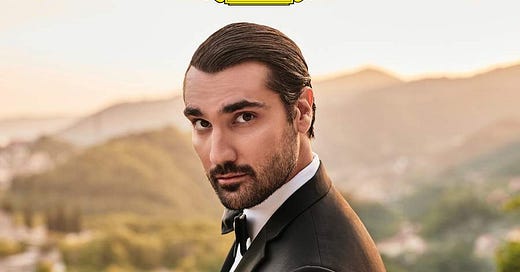Record Review: Jonathan Tetelman: The Great Puccini
A centenary tribute as follow-up to a breakthrough disc debut
Jonathan Tetelman’s first DG album - simply entitled ‘Arias’ - took me by surprise. Having only heard him live in a 2018 English National Opera revival of La bohème - a more than decent performance - I was not expecting to be bowled over by his singing of solos from Giordano’s Fedora, Bizet’s Carmen, Massenet’s Werther, Verdi’s La forza del destino or duets from Zandonai’s Francesca da Rimini (an opera he has filmed from the Deutsche Oper, Berlin) and Il trovatore. But bowled over I was.
In Germany, where the Chilean-born, US-raised tenor’s career has been largely based for the past five years, he has been hailed as ‘the new Jonas Kaufmann’ - lazy journalese because, if anything, his dark, potentially tenore robusto, timbre is far more Latin-sounding than the German star’s.
Tetelman’s new album celebrates - if that’s the word - the 100th anniversary of Puccini’s death. Unlike José Cura’s 1997 album for Erato, it’s not a comprehensive survey. Rinuccio’s delightful pæan to Florence (Gianni Schicchi) is omitted, even though Puccini wrote the role for the same singer as Luigi in Il tabarro, represented here by the duet ‘O Luigi! Luigi!’ with Vida Miknevičiūtė (the Francesca and Trovatore Leonora of his debut album). Indeed, DG have put the boat out for Tetelman. He is partnered by Federica Lombardi, no less, in ‘Che gelida manina’ and ‘O soave fanciulla’ (the latter ardently sung by both), by Rihab Chaieb and Önay Köse in the Pinkerton-Suzuki-Sharpless trio from Act 3 of Madama Butterfly (there’s no ‘Addio, fiorito asil’), and by soprano Marina Monzó, baritone Theodore Platt and Lombardi in the Quartet from La bohème Act 3.
He is deprived of a chorus for Calaf’s ‘Nessun dorma’ but manages exciting climaxes, even if his top lacks an open-throated Corelli-style squillo (the trumpet tones of a true spinto tenor). There is little sense of differentiation between, say, the characters of Ruggero Lastouc (in La Rondine), Des Grieux (Manon Lescaut) and Cavaradossi (Tosca), but the last two are the Puccini roles I would most like to hear him sing in the theatre. Two of Johnson’s brief solos from La fanciulla del West and Roberto’s longer aria from the early Le villi complete the just-short-of-an-hour programme.
With Carlo Rizzi and the PKF - Prague Philharmonia providing sympathetic accompaniments, this is a fine Puccini anniversary collection, from a tenor with undoubted star potential. Fingers crossed.





Haha - he's big in the German-speaking world. I reviewed his Macduff in the Salzburg Macbeth, and saw him recently as Luigi in Trittico in Berlin, which I will review when I've cleared a bit of a backlogue 😈Thanks for commenting, Simon! 🙏
A singer who has, thus far, escaped my attention. Thank you for bringing him to a wider public, Hugh!